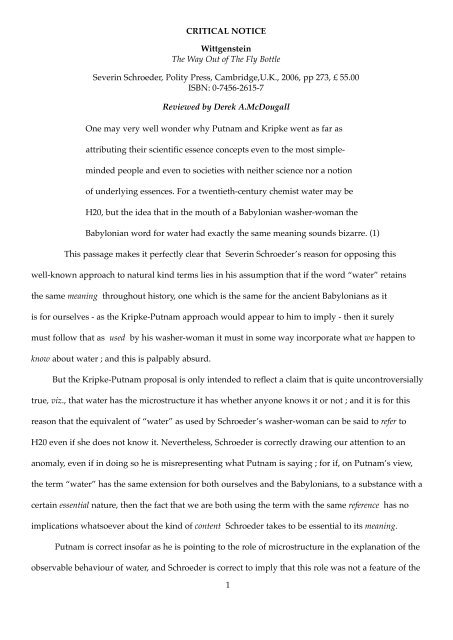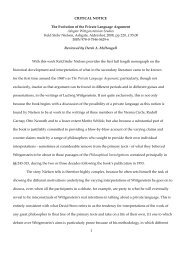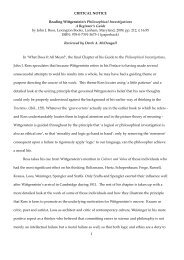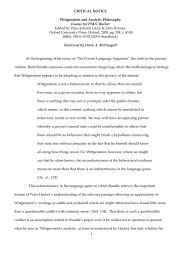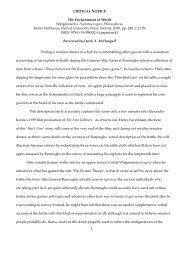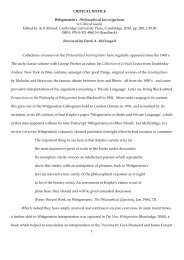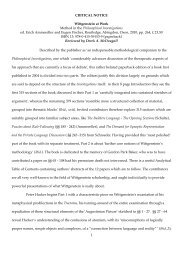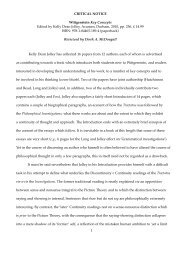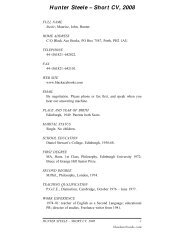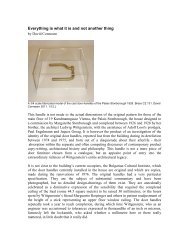Wittgenstein: The Way out of the Flybottle Cambridge
Wittgenstein: The Way out of the Flybottle Cambridge
Wittgenstein: The Way out of the Flybottle Cambridge
You also want an ePaper? Increase the reach of your titles
YUMPU automatically turns print PDFs into web optimized ePapers that Google loves.
CRITICAL NOTICE<strong>Wittgenstein</strong><strong>The</strong> <strong>Way</strong> Out <strong>of</strong> <strong>The</strong> Fly BottleSeverin Schroeder, Polity Press, <strong>Cambridge</strong>,U.K., 2006, pp 273, £ 55.00ISBN: 0-7456-2615-7Reviewed by Derek A.McDougallOne may very well wonder why Putnam and Kripke went as far asattributing <strong>the</strong>ir scientific essence concepts even to <strong>the</strong> most simplemindedpeople and even to societies with nei<strong>the</strong>r science nor a notion<strong>of</strong> underlying essences. For a twentieth-century chemist water may beH20, but <strong>the</strong> idea that in <strong>the</strong> m<strong>out</strong>h <strong>of</strong> a Babylonian washer-woman <strong>the</strong>Babylonian word for water had exactly <strong>the</strong> same meaning sounds bizarre. (1)This passage makes it perfectly clear that Severin Schroeder’s reason for opposing thiswell-known approach to natural kind terms lies in his assumption that if <strong>the</strong> word “water” retains<strong>the</strong> same meaning through<strong>out</strong> history, one which is <strong>the</strong> same for <strong>the</strong> ancient Babylonians as itis for ourselves - as <strong>the</strong> Kripke-Putnam approach would appear to him to imply - <strong>the</strong>n it surelymust follow that as used by his washer-woman it must in some way incorporate what we happen toknow ab<strong>out</strong> water ; and this is palpably absurd.But <strong>the</strong> Kripke-Putnam proposal is only intended to reflect a claim that is quite uncontroversiallytrue, viz., that water has <strong>the</strong> microstructure it has whe<strong>the</strong>r anyone knows it or not ; and it is for thisreason that <strong>the</strong> equivalent <strong>of</strong> “water” as used by Schroeder’s washer-woman can be said to refer toH20 even if she does not know it. Never<strong>the</strong>less, Schroeder is correctly drawing our attention to ananomaly, even if in doing so he is misrepresenting what Putnam is saying ; for if, on Putnam’s view,<strong>the</strong> term “water” has <strong>the</strong> same extension for both ourselves and <strong>the</strong> Babylonians, to a substance with acertain essential nature, <strong>the</strong>n <strong>the</strong> fact that we are both using <strong>the</strong> term with <strong>the</strong> same reference has noimplications whatsoever ab<strong>out</strong> <strong>the</strong> kind <strong>of</strong> content Schroeder takes to be essential to its meaning.Putnam is correct ins<strong>of</strong>ar as he is pointing to <strong>the</strong> role <strong>of</strong> microstructure in <strong>the</strong> explanation <strong>of</strong> <strong>the</strong>observable behaviour <strong>of</strong> water, and Schroeder is correct to imply that this role was not a feature <strong>of</strong> <strong>the</strong>1
Babylonian use <strong>of</strong> <strong>the</strong> term. Never<strong>the</strong>less, Putnam is still correct to say that <strong>the</strong> washer-woman iswrong to include in <strong>the</strong> extension <strong>of</strong> <strong>the</strong> term “water” substances which are not really water, just ashe can tell Archimedes that he is wrong to include in <strong>the</strong> extension <strong>of</strong> “gold” substances we know arenot Au. For that follows solely from <strong>the</strong> point <strong>of</strong> view on microstructure that <strong>the</strong> Babylonians failed toshare. Putnam goes wrong only in his assumption that this could follow from a God’s eye point <strong>of</strong>view which is shareable by no one : that “water” retains its reference through<strong>out</strong> history in allcounterfactual contexts, where this can be assumed to imply anything over and above <strong>the</strong> simplefact that we can, say, translate some relevant Babylonian texts into English, is to say nothing at all.How after all does <strong>the</strong> scholar come to know that <strong>the</strong> Babylonian texts refer to water? Well, from <strong>the</strong>ancient scripts he is translating, he reads, for example, that in one year <strong>the</strong>re was drought, <strong>the</strong> cropsfailed, people died, but that in <strong>the</strong> next year <strong>the</strong> rains came, irrigation resumed, and <strong>the</strong> peopleprospered. It is in this kind <strong>of</strong> context that <strong>the</strong> idea <strong>of</strong> referring to <strong>the</strong> same substance, which weknow to be H20, but which <strong>the</strong> Babylonians did not, makes sense. What is being rejected here is apicture with no application, <strong>the</strong> picture <strong>of</strong> reference as a kind <strong>of</strong> physical pointing via a causal chainto an original use <strong>of</strong> a term, a picture that is just as misleading as Putnam’s sole rejected alternativethat “gold” at any particular point in history means whatever happens to satisfy some contemporaryoperational definition <strong>of</strong> “gold”.Schroeder’s approach to <strong>the</strong> meaning <strong>of</strong> natural kind terms at this point in <strong>the</strong> book is not onlyinteresting in its own right because <strong>of</strong> <strong>the</strong> way in which it misrepresents <strong>the</strong> viewpoint <strong>of</strong> Kripke andPutnam, but also because it is intended to reflect a roughly <strong>Wittgenstein</strong>ian point <strong>of</strong> view. But this point<strong>of</strong> view is derived very much from Peter Hacker (2). Because <strong>of</strong> this, Schroeder neglects ways <strong>of</strong> lookingat <strong>the</strong> puzzle which can more successfully capture <strong>the</strong> kind <strong>of</strong> approach to it that <strong>Wittgenstein</strong> mightvery well have adopted. Just before this, however, Schroeder is more successful in his attack, onlythis time it is directed, not against those who oppose his “common-sense” views <strong>of</strong> linguistic meaningsupposedly derived from <strong>Wittgenstein</strong> (3), but against those who oppose his distinction (4) between2
conceptual and empirical statements. Discussing Saul Kripke’s treatment <strong>of</strong> <strong>Wittgenstein</strong>’sstandard metre rule in § 50 <strong>of</strong> <strong>the</strong> Philosophical Investigations, Schroeder opposes <strong>the</strong> idea thatKripke has come across a new category <strong>of</strong> statement which is both contingent and a priori :“S is one metre long can mean ei<strong>the</strong>r:(F5) S is as a matter <strong>of</strong> fact 1 metre longor:(A5) S is by definition (called) “1 metre long”In denying that <strong>the</strong> standard metre in Paris is or is not onemetre long, <strong>Wittgenstein</strong> takes <strong>the</strong> copula in its factual sense.<strong>The</strong> denial sounds paradoxical because <strong>the</strong>re is also <strong>the</strong> analyticsense, in which it is perfectly correct to say that <strong>the</strong> standard metreis (by definition called) one metre long. (5)But <strong>the</strong>re is no paradox here, according to Schroeder, because what is, in Kripke’s terms,a priori and what is contingent are not <strong>the</strong> same statement. <strong>The</strong> equivocation to which Schroederdraws our attention rests on <strong>Wittgenstein</strong>’s useful reminder that ins<strong>of</strong>ar as it sets <strong>the</strong> standard, <strong>the</strong>standard metre rod cannot be used to measure itself qua standard <strong>of</strong> measurement, and that is whyit cannot be said ei<strong>the</strong>r to be or not to be one metre long. What may or may not be one metre longis a rod on which we incidentally confer <strong>the</strong> role <strong>of</strong> <strong>the</strong> standard metre, but which qua rod is notsomething that is being used to set any standard at all. As a rod per se it will be, or fail to be one metrelong at any particular time depending on prevailing atmospheric conditions, and that is why it canappear that <strong>the</strong>re are circumstances in which <strong>the</strong> standard metre rod may not be as long as itself; andhow could that possibly be?<strong>Wittgenstein</strong>’s answer, which is in accordance with our procedures <strong>of</strong> setting standards<strong>of</strong> measurement, is that what is acting as <strong>the</strong> means <strong>of</strong> representing a certain length cannot also whilstperforming that function be measurable as <strong>the</strong> length it itself represents. In practice, this requires thatin this kind <strong>of</strong> case we define <strong>the</strong> standard <strong>of</strong> length under strict atmospheric conditions to avoid <strong>the</strong>consequences <strong>of</strong> failing to allow for variation in length through time <strong>of</strong> whatever is used as its means3
<strong>of</strong> representation. Ins<strong>of</strong>ar as <strong>the</strong> standard is <strong>the</strong>n acting as an independent norm, it cannot clearly beused to measure itself. Whilst this is harmless, it can give rise to yet ano<strong>the</strong>r paradox because, with<strong>the</strong> passage <strong>of</strong> time, and <strong>the</strong> introduction <strong>of</strong> more accurate standards <strong>of</strong> measurement, it <strong>the</strong>n beginsto appear that we can gradually acquire a much better idea <strong>of</strong> just how long a metre is. This amountsto viewing <strong>the</strong> standard metre as something independent <strong>of</strong> all means <strong>of</strong> representation yet as capable<strong>of</strong> accurate measurement, in which case it comes to be seen as an ideal to which we gradually approachthrough <strong>the</strong> use <strong>of</strong> more sophisticated methods <strong>of</strong> defining what a metre is. Paradoxes <strong>of</strong> this kindoriginate in thinking ambivalently <strong>of</strong> <strong>the</strong> standard metre described by Kripke as 39.37 inches long,when this can ei<strong>the</strong>r be a factual claim ab<strong>out</strong> <strong>the</strong> exact length <strong>of</strong> a rod, or a way <strong>of</strong> describing <strong>the</strong> role<strong>the</strong> metre rod is playing in defining one method <strong>of</strong> measurement amongst o<strong>the</strong>rs. Whilst in playingthat role <strong>the</strong> metre rod acquires <strong>the</strong> status <strong>of</strong> a norm which in one respect is independent <strong>of</strong> its means<strong>of</strong> representation, <strong>the</strong> length <strong>of</strong> one metre at any particular point in history is always clearly parasiticupon <strong>the</strong> more and more exacting criteria we come to use to define it.<strong>The</strong> two important questions already discussed here come from <strong>the</strong> last chapter <strong>of</strong>Schroeder’s book, a chapter devoted to philosophy after <strong>Wittgenstein</strong>. This chapter owes, as headmits, a great deal to Peter Hacker’s magisterial account <strong>of</strong> <strong>Wittgenstein</strong>’s place in 20th centuryanalytic philosophy. Immediately preceding this is a very short chapter, three pages long, concerning<strong>Wittgenstein</strong>’s final years after 1945, bringing <strong>the</strong> biographical content <strong>of</strong> <strong>the</strong> book to its close. Thisstory <strong>of</strong> a life is only one aspect <strong>of</strong> a work which, according to Hans Johann-Glock, is a “trulyimpressive achievement” and a “genuinely groundbreaking introduction to its subject” :What is particularly striking is <strong>the</strong> combination <strong>of</strong> three elements whichhave rarely if ever been combined in such a forceful way : a well-informedand succinct presentation <strong>of</strong> <strong>the</strong> biographical and cultural context <strong>of</strong><strong>Wittgenstein</strong>’s work, an exposition <strong>of</strong> his central texts which combines lucidintroduction with novel scholarship, and a dialectically astute discussion <strong>of</strong><strong>the</strong> substantive philosophical issues. (6)4
This is praise indeed, and whilst a certain amount <strong>of</strong> biographical material is almost obligatory inany account <strong>of</strong> <strong>Wittgenstein</strong>’s philosophy intended to suit both a general and a specialised readership,no story ab<strong>out</strong> <strong>Wittgenstein</strong>’s life and work can be truly introductory in presenting an uncontroversialassessment <strong>of</strong> material which at every stage is <strong>the</strong> subject <strong>of</strong> more than exegetical dispute; and as <strong>the</strong>account presented by Schroeder illustrates, properly relating <strong>the</strong> philosophical content to its biographicaland cultural context is an extraordinarily difficult thing for any author to achieve. <strong>The</strong> story begins witha 22 page introduction bringing <strong>the</strong> reader from <strong>Wittgenstein</strong>’s birth to <strong>the</strong> end <strong>of</strong> <strong>the</strong> First World Warand <strong>the</strong> publication <strong>of</strong> <strong>the</strong> Tractatus. <strong>The</strong>re follows a central section <strong>of</strong> 8 pages discussing <strong>the</strong> intermediateperiod from his time as a schoolmaster to <strong>Wittgenstein</strong>’s return to <strong>Cambridge</strong> in 1929, plus <strong>the</strong> shortaccount <strong>of</strong> his final years. But <strong>the</strong> much longer introductory section pays an attention to Fin de SiecleVienna (almost 6 pages) which in <strong>the</strong> circumstances is disproportionate because <strong>the</strong> cultural backgroundseems almost incidental to <strong>the</strong> <strong>Wittgenstein</strong> story. This section also includes just over 4 additional pagesab<strong>out</strong> Frege and quantification - with elementary logical symbolism - entirely unexpected in anintroductory historical narrative, and raising <strong>the</strong> question whe<strong>the</strong>r this is its proper context. <strong>The</strong> adviceto <strong>the</strong> reader to omit this section if familiar with <strong>the</strong> basics <strong>of</strong> formal logic only serves to highlight <strong>the</strong>incongruity, for if it had been introduced with <strong>the</strong> Tractatus account this would have been unnecessary.Although this assumes less importance when viewed in relation to <strong>the</strong> main aims <strong>of</strong> <strong>the</strong> bookand its assessment <strong>of</strong> <strong>Wittgenstein</strong>’s earlier and later philosophy, it suggests that <strong>the</strong> attempt to integrate<strong>the</strong> biographical information into <strong>the</strong> overall narrative by relating it closely to <strong>the</strong> development <strong>of</strong><strong>Wittgenstein</strong>’s thought - if this is indeed <strong>the</strong> aim - is difficult for any author to achieve. As it is, whatremains are interesting biographical snippets which are all available elsewhere. <strong>The</strong>se considerations,for all that <strong>the</strong>ir relevance is largely aes<strong>the</strong>tic, have just not been given <strong>the</strong> attention <strong>the</strong>y deserve.<strong>The</strong> account <strong>of</strong> <strong>the</strong> Philosophical Investigations begins well by relating its style and presentation tothat <strong>of</strong> <strong>the</strong> Tractatus, although Schroeder annoyingly gives <strong>the</strong> appearance <strong>of</strong> having to apologise foraspects <strong>of</strong> <strong>Wittgenstein</strong>’s approach that fail to meet conventional philosophical expectations. We are told,for example, that because <strong>of</strong> <strong>Wittgenstein</strong>’s cut and paste procedure <strong>of</strong> assembling individual remarks,“Often <strong>the</strong> original context that <strong>Wittgenstein</strong> preferred to leave <strong>out</strong> would have provided some fur<strong>the</strong>r5
elucidations and made <strong>the</strong> passage much easier to understand” (7) . If this is already beginningto suggest that Schroeder is describing an author who is not in full control <strong>of</strong> his material, what he<strong>the</strong>n goes on to say appears only to confirm what <strong>the</strong> reader has already been given to suspect:Again, it is not surprising that <strong>the</strong> link between two sequential remarksmay appear somewhat unclear or less than compelling if originally <strong>the</strong>ywere written in different contexts, perhaps in different decades, and havenot even been rephrased so as to fit each o<strong>the</strong>r. (8)<strong>The</strong> example given to support this conclusion is <strong>the</strong> juxtaposition <strong>of</strong> Investigations § 246 and§ 247, said to be incoherent, and whilst one concerns knowledge ab<strong>out</strong> one’s sensations, and <strong>the</strong>o<strong>the</strong>r knowledge ab<strong>out</strong> one’s intentions, <strong>the</strong> common thread is that in both cases “to know ” meansthat <strong>the</strong> expression <strong>of</strong> uncertainty is senseless. It may indeed be <strong>the</strong> case that one’s claim to knowone’s own intentions is <strong>of</strong>ten an unreliable guide to what <strong>the</strong>y really are, but if we read him charitably,this does not affect <strong>Wittgenstein</strong>’s point in § 247, which is just that ins<strong>of</strong>ar as it is assumed to be truethat “Only you could know if you had that intention”, it would not be in <strong>the</strong> least disingenuous to claimthat <strong>the</strong> passage conveys what a claim to knowledge would come to in this context. In <strong>the</strong> same way,<strong>the</strong> fact that § 580 occurs in a context that has nothing to do with our sensations does not mean thatit may not be relevant to a philosophical account <strong>of</strong> <strong>the</strong>m.Doubts over Schroeder’s presentation continue to arise through<strong>out</strong> <strong>the</strong> followingsections, for in <strong>the</strong> course <strong>of</strong> making <strong>the</strong> fairly common observation that philosophically-inspiredreaders are <strong>of</strong>ten inclined to read into <strong>the</strong> Investigations <strong>the</strong>oretical standpoints that <strong>the</strong> text failsto support, he claims that “Common-sense observations are spiced up” in a way that is totally atodds with <strong>Wittgenstein</strong>’s philosophy: “<strong>The</strong> only position it adopts is that <strong>of</strong> common sense”. (9) Thisuse <strong>of</strong> <strong>the</strong> term “common sense” is repeated at length in o<strong>the</strong>r contexts in <strong>the</strong> book, but beforeconsidering it fur<strong>the</strong>r, it is worth looking at <strong>the</strong> message provided by <strong>the</strong> final sentence <strong>of</strong> thisdiscussion ab<strong>out</strong> <strong>the</strong> self-fulfilling prophecies <strong>of</strong> those commentators who read <strong>the</strong>oretical standpointsinto <strong>the</strong> Investigations:6
Of course, an author cannot be held responsible for misinterpretationsthat are due to people’s prejudices, but <strong>the</strong> difficulties mentioned earliercould have been avoided. One may well wonder why <strong>Wittgenstein</strong> didnot make things easier for his readers. (10)Once again, <strong>the</strong> picture is <strong>of</strong> an author who, if only be had thought more ab<strong>out</strong> hisreaders and presented his conclusions in a slightly more conventional fashion, would have avoidedmisinterpretation in returning us to “common sense”. In this regard, we are told later on that “...whenin <strong>the</strong> grip <strong>of</strong> a misleading picture <strong>of</strong> meaning, we need to be reminded <strong>of</strong> our common sense...” (11)We are also reminded that “.....<strong>the</strong> metaphysical rejection <strong>of</strong> our common-sense classifications turns<strong>out</strong> to be mere show.” (12) This aspect <strong>of</strong> Schroeder’s presentation is <strong>of</strong>ten repeated:So <strong>the</strong>re is nothing extraordinary in <strong>the</strong> fact that <strong>the</strong> platitudes towhich <strong>Wittgenstein</strong> draws our attention should not go unchallengedamong philosophers. It is only to those with no philosophical positionsto defend that <strong>Wittgenstein</strong>’s reminders are meant to be uncontroversial. (13)<strong>The</strong> very term “common sense” can in a philosophical context be used to commit amultitude <strong>of</strong> sins, so it is hardly surprising that Schroeder’s use <strong>of</strong> it should point towards acertain ambivalence in his presentation, captured in his claim that “....philosophical <strong>the</strong>ories havealways contradicted <strong>the</strong> most humdrum observations <strong>of</strong> common sense, so why should weexpect <strong>Wittgenstein</strong>’s reminders <strong>of</strong> common sense to be safe from <strong>the</strong> onslaughts <strong>of</strong> philosophicalperversity?” (14) But we are also told that:In a number <strong>of</strong> case studies, <strong>Wittgenstein</strong> gives convincing reasonswhy philosophical <strong>the</strong>ories are not just false and in need <strong>of</strong> replacementby better <strong>the</strong>ories, but are sheer nonsense or patent falsehood, to bedissolved in favour <strong>of</strong> common sense. (15)<strong>The</strong> ambivalence rests on an uncertainty in any particular case whe<strong>the</strong>r Schroederregards his “common sense position” as even open to philosophical assessment, for this determines7
<strong>the</strong> kind <strong>of</strong> response <strong>Wittgenstein</strong> is supposedly making to any philosophical attempt to undermineit. Yet beyond Schroeder’s claim that <strong>Wittgenstein</strong> aims to dispel confusion, it is never quite clear whatthis comes to. Depending on <strong>the</strong> context, it appears ei<strong>the</strong>r that “common sense” has <strong>the</strong> upper handbecause it is not intended to incorporate any kind <strong>of</strong> philosophical proposal, in which case nophilosophical proposal can undermine it; or <strong>the</strong> onslaught <strong>of</strong> philosophical proposals apparentlyundermining common sense fails in its objective because <strong>the</strong>se proposals involve misunderstandingor confusion ab<strong>out</strong> <strong>the</strong> common sense position, whatever that might be. Again, <strong>the</strong> common senseposition might stand fast because <strong>the</strong>re are circumstances in which our words are properly used tosay certain things in accordance with commonly accepted criteria for <strong>the</strong>ir application, in which case itis senseless to say that <strong>the</strong>se criteria both do have an application yet cannot have an application, as<strong>the</strong> wayward philosopher may seem to propose.Ironically, this last alternative provides an interpretation <strong>of</strong> what used to be referred to as<strong>the</strong> argument from <strong>the</strong> paradigm case which comes quite close to matching what <strong>Wittgenstein</strong> saysab<strong>out</strong> grammar ; yet in this context it would not absolve <strong>the</strong> “<strong>Wittgenstein</strong>ian” <strong>of</strong> <strong>the</strong> philosophicalcharge that he is propounding an anti-realist argument. What Schroeder’s assessment fails to pointtowards is any hint that grammar rests on <strong>the</strong> bedrock <strong>of</strong> our actual practices <strong>of</strong> talking <strong>of</strong> our ownfeelings and those <strong>of</strong> o<strong>the</strong>rs, <strong>of</strong> calculating in <strong>the</strong> course <strong>of</strong> working through a ma<strong>the</strong>matical pro<strong>of</strong> or,in general terms, <strong>of</strong> just following a rule. <strong>The</strong>re is no hint ei<strong>the</strong>r that what he terms a common senseproposal rests in <strong>Wittgenstein</strong>’s terms on our being party to a picture, <strong>the</strong> picture <strong>of</strong> <strong>the</strong> pain that goeson in him in <strong>the</strong> way it goes on in me, or <strong>the</strong> picture <strong>of</strong> rules as rails stretching to infinity, capturingquite unproblematically what in an ordinary context can be said to accompany our talk ab<strong>out</strong> eacho<strong>the</strong>rs feelings, or <strong>the</strong> blind confidence integral to our practice <strong>of</strong> mastering a language. Nei<strong>the</strong>r is<strong>the</strong>re any suggestion that <strong>Wittgenstein</strong> takes our understanding in <strong>the</strong>se fields to rest not on anyapplication we may attempt to make in philosophy <strong>of</strong> <strong>the</strong> picture. For if it did, <strong>the</strong> application <strong>of</strong><strong>the</strong> picture would become problematic, giving rise to philosophical difficulties precisely becauseit has become segregated from <strong>the</strong> grammar <strong>of</strong> <strong>the</strong> language, expressed through <strong>the</strong> practices in8
which <strong>the</strong> use <strong>of</strong> our ordinary terms is enshrined.Consequently, if <strong>the</strong> distinction between our ordinary practices and <strong>the</strong> use we may beinclined to make in philosophy <strong>of</strong> certain pictures which ordinarily and unreflectively accompany<strong>the</strong>se practices, is not clearly drawn - however it is expressed - a central feature <strong>of</strong> <strong>Wittgenstein</strong>’sthinking, captured in his novel methodological strategies, will altoge<strong>the</strong>r fail to be recognised. Butthis methodology is integral to our understanding <strong>of</strong> <strong>the</strong> way in which <strong>Wittgenstein</strong> provides a newperspective from which to view <strong>the</strong> problems <strong>of</strong> philosophy. In <strong>the</strong> absence <strong>of</strong> that perspective, hemay appear, for example, to be no more than ano<strong>the</strong>r ordinary language philosopher, thought to bebegging <strong>the</strong> question whe<strong>the</strong>r <strong>the</strong> ordinary use <strong>of</strong> our concepts can genuinely be taken to justify <strong>the</strong>philosophical standpoints <strong>the</strong>y are commonly assumed in philosophy to ei<strong>the</strong>r reflect or presuppose.Near <strong>the</strong> beginning <strong>of</strong> his treatment <strong>of</strong> Part I <strong>of</strong> <strong>the</strong> Investigations - like many o<strong>the</strong>rcommentators, he does not see Part II as genuinely part <strong>of</strong> <strong>the</strong> work - Schroeder provides a usefullist <strong>of</strong> 16 topics into which he splits its text, from a Critique <strong>of</strong> <strong>the</strong> Tractatus View <strong>of</strong> Language insections §§ 1-108, to Willing and Remembered Intention at its close, covering §§ 611-632 and§§ 633-693. Schroeder understands §§ 1-137 <strong>of</strong> <strong>the</strong> Investigations to be very much concerned with<strong>the</strong> dissolution <strong>of</strong> <strong>the</strong> logical atomism <strong>of</strong> <strong>the</strong> Tractatus, and to that end he identifies 6 basic ideas hetakes to underlie <strong>the</strong> edifice <strong>of</strong> <strong>the</strong> Tractatus, criticisms <strong>of</strong> which in <strong>the</strong> Investigations he <strong>the</strong>nproceeds to discuss in detail under <strong>the</strong> headings: Referentialism ; Determinacy <strong>of</strong> sense ; Logicalanalysis ; Bipolarity ; Essentialism ; and Meaning through meaning. This is a creditable approach,and well-represented in <strong>the</strong> literature. Some sound points are made, e.g., that Augustine’s account<strong>of</strong> learning a language, in pointing towards <strong>the</strong> position that every word has a meaning as <strong>the</strong>object for which <strong>the</strong> word stands, bears comparison with Tractatus 3.203, only that <strong>the</strong> names <strong>of</strong><strong>the</strong> Tractatus are <strong>the</strong> signs that a complete analysis <strong>of</strong> ordinary language would bring to light.On <strong>the</strong> o<strong>the</strong>r hand, <strong>the</strong>re is no suggestion that Augustine’s child points towards anythingo<strong>the</strong>r than a criticism <strong>of</strong> <strong>the</strong> name-object conception <strong>of</strong> language, that <strong>the</strong>re is, for example, afundamental issue at stake in <strong>the</strong> child’s appearing conceptually articulate prior to his beingable to talk ( § 32 ), that such a presumption underlies <strong>the</strong> idea <strong>of</strong> a born Crusoe, or that <strong>the</strong>re is9
anything odd in <strong>the</strong> strange behaviour <strong>of</strong> <strong>the</strong> shopkeeper and builders, indicating at <strong>the</strong> very leastthat because language has become for <strong>Wittgenstein</strong> <strong>the</strong> vehicle <strong>of</strong> thought, <strong>the</strong> relative limitations <strong>of</strong><strong>the</strong>ir languages reflect limitations in <strong>the</strong>ir levels <strong>of</strong> awareness. <strong>The</strong>re is no suggestion ei<strong>the</strong>r that <strong>the</strong>shopkeeper’s manifest behavioural r<strong>out</strong>ine in any respect bears comparison to that <strong>of</strong> an automaton,reflecting a set <strong>of</strong> automatic, internal procedures <strong>of</strong> a kind which in philosophy are sometimesemployed to explain <strong>the</strong> ordinary application <strong>of</strong> our concepts, a point to which by bringing <strong>the</strong>m into<strong>the</strong> open <strong>Wittgenstein</strong> can ironically be taken to be drawing our attention. Certainly, not gesturingtowards <strong>the</strong>se possibilities cannot be construed as a fault, for some <strong>of</strong> <strong>the</strong>m do come ra<strong>the</strong>r late in<strong>the</strong> secondary literature (16). Schroeder continues by giving an illuminating account <strong>of</strong> how <strong>the</strong> 6basic ideas he has <strong>out</strong>lined as central to logical atomism, are criticised and undermined, and thiswill prove familiar territory to those already acquainted with most <strong>of</strong> <strong>the</strong> vast secondary literaturedealing with <strong>the</strong> textual exegesis <strong>of</strong> <strong>the</strong>se well-known passages.At <strong>the</strong> same time <strong>the</strong>re is no real sense <strong>of</strong> <strong>the</strong> greatness <strong>of</strong> <strong>Wittgenstein</strong>’s achievementin putting <strong>the</strong> very conception <strong>of</strong> philosophy to which many philosophers adhere, itself in question,or <strong>of</strong> how a certain new way <strong>of</strong> looking at things could even remotely have come to its creator asboth a revelation and a liberation. <strong>The</strong> tone is negative in describing a wholly negative achievement.Schroeder sets up a straw man whilst providing his conception <strong>of</strong> <strong>Wittgenstein</strong>’s methodology :It is customary for commentaries on <strong>the</strong> Philosophical Investigations aftera chapter on <strong>Wittgenstein</strong>’s criticisms <strong>of</strong> his earlier position to move on toan account and discussion <strong>of</strong> <strong>the</strong> book’s positive doctrines. That, however,is a mistake, for <strong>the</strong> book does not propound any positive philosophical doctrines.Its thrust is entirely negative, aimed at nothing more and nothing less thana demonstration that philosophical doctrine is invariably <strong>the</strong> result <strong>of</strong> linguisticconfusion (PI § 119), which needs to be cleared up and removed, somewhatlike a disease <strong>of</strong> <strong>the</strong> understanding (PI § 255). (17)10
Following a workmanlike and competent treatment <strong>of</strong> a range <strong>of</strong> issues surroundingmeaning and use and <strong>the</strong> nature <strong>of</strong> philosophy, Schroeder turns to a discussion <strong>of</strong> <strong>the</strong> importanttopic <strong>of</strong> following a rule, accompanied in <strong>the</strong> secondary literature by <strong>the</strong> problem raised in Kripke’ssceptical challenge and <strong>the</strong> multiple assessments by commentators <strong>of</strong> what <strong>the</strong>y assume to be<strong>Wittgenstein</strong>’s response to it. Schroeder swiftly dismisses what on his interpretation constitutesKripke’s so-called “community view”, claiming that <strong>the</strong>re is no textual support for it in <strong>the</strong>Investigations and, whilst not quite expressing <strong>the</strong> point in <strong>the</strong>se terms, adopting Peter Hacker’sapproach resting on <strong>the</strong> assumption that because a born Crusoe is conceivable, rule-following isessentially shareable ra<strong>the</strong>r than essentially shared. This is familiar territory, going back to ColinMcGinn’s famous criticism <strong>of</strong> Kripke amongst o<strong>the</strong>rs (18), and it is no fault <strong>of</strong> Schroeder’s that headopts one <strong>of</strong> a number <strong>of</strong> standard responses to <strong>the</strong> questions commonly raised. Although hisoverall stand against Kripke is too overtly dismissive to fully appreciate <strong>the</strong> role that Kripke hasplayed in <strong>the</strong> secondary literature - an attitude he again shares with Hacker - he does give a goodaccount <strong>of</strong> <strong>the</strong> rule-following sections <strong>of</strong> <strong>the</strong> Investigations and in closing does make <strong>the</strong> valid point,albeit differently expressed, that it is only because Kripke is party to <strong>the</strong> highly misleading picture inwhich he takes our understanding <strong>of</strong> following a rule to consist, that he is forced to see his own<strong>Wittgenstein</strong> as proposing an anti-realist argument as a “solution” to his sceptical paradox.What is lacking, though - a point consequent upon Schroeder’s idea that <strong>Wittgenstein</strong>’s aim is toreturn us to <strong>the</strong> platitudes <strong>of</strong> common-sense - is any engagement with <strong>the</strong> idea that <strong>the</strong>re is a positiveaspect to <strong>Wittgenstein</strong>’s treatment <strong>of</strong> both <strong>the</strong> concept <strong>of</strong> <strong>the</strong> born Crusoe and <strong>the</strong> rule-followingparadox as <strong>the</strong> source <strong>of</strong> philosophical misunderstandings ab<strong>out</strong> what it is, in ordinary circumstances,to acquire and employ a language. At one extreme, <strong>the</strong> rule-following paradox treats <strong>the</strong> ordinaryapplication <strong>of</strong> a rule apart from its context in those practical affairs in which it finds its normalexpression, and at <strong>the</strong> o<strong>the</strong>r <strong>the</strong> born Crusoe takes <strong>the</strong> exercise <strong>of</strong> <strong>the</strong> rule to be pre-determined by <strong>the</strong>possession <strong>of</strong> a capacity operating in isolation from <strong>the</strong> social background against which we come tounderstand its actual application. But if in <strong>the</strong> attempt to abandon this Platonist picture <strong>of</strong> <strong>the</strong> bornCrusoe magically encompassing within himself <strong>the</strong> capacities required to master a rule in an infinite11
number <strong>of</strong> applications, <strong>the</strong> temptation is to retreat to a single instance <strong>of</strong> falling a rule, one <strong>the</strong>nbecomes victim to <strong>the</strong> rule-following paradox. Caught in what appears a classically insolubledilemma, only <strong>the</strong> introduction <strong>of</strong> Kripke’s community, performing a quite specific role, can save<strong>the</strong> day and prevent an interminable oscillation from one unacceptable extreme to <strong>the</strong> o<strong>the</strong>r. Yetfor <strong>Wittgenstein</strong> both <strong>the</strong> born Crusoe ( § 32 ) and <strong>the</strong> rule-following paradox are <strong>the</strong>mselves <strong>the</strong>result <strong>of</strong> staring at a picture in isolation from <strong>the</strong> normal surroundings in which linguistic masteryis acquired and expressed. <strong>The</strong> rule-following paradox results from taking our ordinary practice <strong>of</strong>following a rule <strong>out</strong> <strong>of</strong> context, staring at a single occasion when <strong>the</strong> idea <strong>of</strong> following a rule ononly one occasion makes no sense ( § 199 ). Yet <strong>the</strong> idea <strong>of</strong> training into a practice provides anew way <strong>of</strong> countering <strong>the</strong> born Crusoe, just as a call to return to <strong>the</strong> contexts in which a rule isactually applied ( § 198 and § 201) is intended to show how in a philosophical context it is soeasy to give <strong>the</strong> paradox - to use a phrase <strong>of</strong> Peter Winch’s (19) - <strong>the</strong> wrong kind <strong>of</strong> emphasis.Here as elsewhere, it would be in keeping with <strong>Wittgenstein</strong>’s methodological perspective toadopt nei<strong>the</strong>r a realist nor an anti-realist stance as a consistent reaction to those pictures he takesto condition our entire philosophical landscape.Schroeder for <strong>the</strong> most part deftly handles <strong>the</strong> difficulties which face any commentator in<strong>the</strong> interpretation <strong>of</strong> passages relating to <strong>the</strong> idea <strong>of</strong> a private object and <strong>the</strong> possibility <strong>of</strong> a privatelanguage. Yet even here, <strong>the</strong>re is an ambivalence in his presentation which leads him to say,carelessly, that when a person complains to <strong>the</strong> doctor ab<strong>out</strong> a pain in his left knee, <strong>the</strong>n he isable to successfully communicate his complaint quite independently <strong>of</strong> “whe<strong>the</strong>r what goes on in<strong>the</strong> inviolable privacy <strong>of</strong> <strong>the</strong> subject’s mind is <strong>of</strong> type x, y, or z ” (20). But this is to invite Kripke’sresponse that if <strong>Wittgenstein</strong> is telling him that he cannot uncontroversially identify his ownsensations, or that <strong>the</strong>se sensations do not really present <strong>the</strong>mselves to him with that distinctivequalitative feel which tells him what kinds <strong>of</strong> sensations <strong>the</strong>y are, <strong>the</strong>n he is being asked torenounce a philosophical claim constituting <strong>the</strong> very paradigm <strong>of</strong> what he can justifiably claim toknow. What, Kripke demands <strong>of</strong> <strong>Wittgenstein</strong>, has his ability to identify his own sensations got todo with his behaviour in <strong>the</strong> surrounding community? (21).12
Yet at one level, Kripke’s proposals are not what <strong>Wittgenstein</strong> would have cared to deny:Kripke describes what it is like, say, to experience a new sensation <strong>of</strong> a kind one has never feltbefore, one for which in an ad hoc fashion one may decide to invent a name. <strong>The</strong> sensation reallydoes have a distinct qualitative feel <strong>of</strong> <strong>the</strong> kind to which Kripke draws our attention. It is only in aphilosophical context, however, that this kind <strong>of</strong> talk becomes problematic, because it <strong>the</strong>n reallydoes begin to look as if one is “tracing <strong>the</strong> <strong>out</strong>line <strong>of</strong> <strong>the</strong> thing’s nature over and over again, andone is merely tracing round <strong>the</strong> frame through which we look at it” ( § 114 ). What appears to have<strong>the</strong> character <strong>of</strong> an important metaphysical revelation is instead a consequence <strong>of</strong> viewing <strong>the</strong>criterionless aspect <strong>of</strong> first person sensation ascription in isolation from its normal surroundings <strong>of</strong>application: “ How do I know that this colour is red? - It would be an answer to say: ‘I have learntEnglish’.” (§ 381). In <strong>the</strong> same way, one can fantasise in a Cartesian fashion ab<strong>out</strong> suddenlyfinding one’s self with<strong>out</strong> a body, unable to communicate with o<strong>the</strong>rs, yet still able to talk to one’sself inwardly ab<strong>out</strong> one’s sensations, because daydreams <strong>of</strong> this kind exploit <strong>the</strong> idea <strong>of</strong> someonewho is already master <strong>of</strong> a public language, no matter what imaginary misadventures might befallhim. Consequently, <strong>Wittgenstein</strong>’s complaint is not that we cannot readily indulge in fantasies <strong>of</strong>this kind, but that in a philosophical context we can so easily misconstrue <strong>the</strong>ir significance.It is better, overall, to see what is going on in § 258 and in § 265, with <strong>the</strong>ir misleadingepistemological overtones, as a reflection <strong>of</strong> what is said in <strong>the</strong> infamous last paragraph <strong>of</strong> § 288,with its reference to <strong>the</strong> legitimate question <strong>of</strong> doubt which begins to arise as soon as one leaves<strong>the</strong> expression <strong>of</strong> sensation in a public language. Through<strong>out</strong> his discussion, <strong>Wittgenstein</strong> ispresupposing, not that a certain procedure cannot be carried <strong>out</strong> because it is beyond our powers,viz., <strong>the</strong> procedure <strong>of</strong> privately identifying a sensation again correctly, thus allowing for <strong>the</strong>possibility that what is at stake is an important philosophical question, but that judged from <strong>the</strong>standpoint <strong>of</strong> <strong>the</strong> ordinary criterionless aspect <strong>of</strong> first person sensation ascription, <strong>the</strong>re is nothingin which such an identification could consist.Again, <strong>the</strong> extent to which any <strong>of</strong> this comes through in Schroeder’s presentation ishampered by a certain ambivalence, for in his treatment <strong>of</strong> § 258 we are told (22) that <strong>Wittgenstein</strong>13
provides a ra<strong>the</strong>r harsh verdict in his claim that “here we can’t talk ab<strong>out</strong> ‘right’ ”. <strong>The</strong> reasonfor this, according to Schroeder, is that “It would still be wrong for me to write down ‘S ’ on aday when none <strong>of</strong> my sensations seemed to be <strong>of</strong> <strong>the</strong> same kind as <strong>the</strong> one I initially called‘S ’. Hence....one can very well speak <strong>of</strong> a right or correct application <strong>of</strong> ‘S’ ” (23). But thisreference to sensations <strong>of</strong> <strong>the</strong> same kind indicates an adherence to an ambivalent conception<strong>of</strong> privacy, pointing to a quite ordinary application on <strong>the</strong> one hand, whilst appearing to havesome relevance to what <strong>Wittgenstein</strong> is saying ab<strong>out</strong> <strong>the</strong> possibility <strong>of</strong> a private language,on <strong>the</strong> o<strong>the</strong>r. Yet this notion <strong>of</strong> privacy is precisely <strong>the</strong> one used by those philosophers whohave traditionally accused <strong>Wittgenstein</strong> <strong>of</strong> so-called “verificationist” leanings. Towards <strong>the</strong>end <strong>of</strong> <strong>the</strong> same paragraph, however, Schroeder points in quite a different direction by correctlyexplaining <strong>the</strong> content <strong>of</strong> Wittgensten’s presentation in § 288 : <strong>the</strong>re is no question <strong>of</strong> doubt in <strong>the</strong>public language, because <strong>the</strong> question <strong>of</strong> error - and so <strong>of</strong> identification - cannot <strong>the</strong>n arise. Butthis is <strong>the</strong> very distinction that <strong>Wittgenstein</strong>, stressing <strong>the</strong> criterionless aspect <strong>of</strong> first personsensation ascription, employs to differentiate <strong>the</strong> private language from <strong>the</strong> public when hestates that <strong>the</strong>re is no criterion <strong>of</strong> correctness because, in his wholly private context <strong>the</strong>re isultimately nothing that sensation language could even be understood to be.It is not uncommon for scholars, with a notable exception in Peter Hacker with hiscontinuation <strong>of</strong> <strong>the</strong> Baker and Hacker commentaries, to end <strong>the</strong>ir discussions <strong>of</strong> <strong>the</strong> Investigationsat, or shortly after <strong>the</strong> sections on privacy, on seeing aspects, or on thinking and consciousness ;but Schroeder goes directly to his own categories <strong>of</strong> Willing and Remembered Intention runningfrom §§ 611-693. In comparison to <strong>the</strong> wealth <strong>of</strong> published commentary ab<strong>out</strong> <strong>the</strong> early parts <strong>of</strong> <strong>the</strong>book, <strong>the</strong>se sections <strong>of</strong> <strong>the</strong> Investigations have received relatively little attention, and it is to hiscredit that Schroeder considers passages which many philosophers may prefer to leave untouchedbecause <strong>of</strong> <strong>the</strong> interpretative difficulties <strong>the</strong>y inevitably incur. Although he provides a conventionalrendering (24) <strong>of</strong> what is at stake in <strong>the</strong> infamous § 621, he does not discuss Stewart Candlish’s (25)treatment <strong>of</strong> <strong>the</strong> issue, beginning with his puzzlement over § 611, and now recognised as a seminal14
paper in <strong>the</strong> field. Candlish sees <strong>Wittgenstein</strong>’s passages on <strong>the</strong> will as having been refined almost to <strong>the</strong>point <strong>of</strong> unintelligibility. Schroeder attacks <strong>the</strong> inner-object conception <strong>of</strong> voluntary action as untenable,objects to Hornsby and O’Shaughnessy and discusses Grice on trying, makes standard objections to <strong>the</strong>idea <strong>of</strong> willing as being subject to <strong>the</strong> will, as leading to a regress, and in a final discussion <strong>of</strong> acting forreasons, concludes that first person authority is at <strong>the</strong> core <strong>of</strong> his concept <strong>of</strong> a reason.Turning to Schroeder’s account <strong>of</strong> <strong>the</strong> Tractatus, even <strong>the</strong> most casual reader will quicklybecome aware that this is a work with which he is much more engaged and in which he is much moreat home in terms both <strong>of</strong> his close familiarity with its content and with <strong>the</strong> quality <strong>of</strong> his scholarship.Even <strong>the</strong> little touches <strong>of</strong> biography which occasionally appear, like <strong>the</strong> brief mention <strong>of</strong> <strong>Wittgenstein</strong>’sreading, on a patrol boat on <strong>the</strong> River Vistula at <strong>the</strong> beginning <strong>of</strong> <strong>the</strong> First World War, <strong>of</strong> <strong>the</strong> Paris lawsuit and <strong>the</strong> car accident said to have played a role in <strong>the</strong> development <strong>of</strong> <strong>the</strong> picture <strong>the</strong>ory, succeedin enlivening <strong>the</strong> text. <strong>The</strong> seven major sections <strong>of</strong> <strong>the</strong> book he describes under 5 headings: <strong>The</strong> world ;Thought ; Language ; Logic ; and <strong>The</strong> ineffable. Schroeder <strong>the</strong>n fur<strong>the</strong>r sub-divides <strong>the</strong>se subjects toprovide a table <strong>of</strong> contents under 28 categories. Having remarked at <strong>the</strong> beginning that <strong>the</strong> Tractatus isone <strong>of</strong> <strong>the</strong> most inaccessible works in <strong>the</strong> philosophical canon, one which it is difficult to approachwith<strong>out</strong> a preliminary commentary, he <strong>the</strong>n proceeds to provide one : in 90 pages, he more thanadequately covers <strong>the</strong> topics he has identified. Schroeder describes, for example, <strong>the</strong> a prioripostulation <strong>of</strong> simple objects, implicitly rejecting <strong>the</strong> claim that <strong>Wittgenstein</strong> believed <strong>the</strong>y could beidentified with sense-data, and provides three detailed arguments - relating <strong>the</strong> text <strong>of</strong> <strong>the</strong> Tractatus toInvestigations § 39 and § 55, for clarification <strong>of</strong> <strong>the</strong> earlier viewpoint - described under <strong>the</strong> headings:Analysis must come to an end ; Autonomy <strong>of</strong> sense ; and Determinacy <strong>of</strong> sense. He clearly identifies <strong>the</strong>determining factor governing matters which cannot be said but must be shown to be <strong>the</strong> principle <strong>of</strong>bipolarity, resulting in <strong>the</strong> notorious conclusion that an entire range <strong>of</strong> propositions, including thoseexpressing necessary truths, <strong>the</strong> logical form <strong>of</strong> reality, <strong>the</strong> doctrine <strong>of</strong> solipsism, ethical judgements and,finally, <strong>the</strong> statements <strong>of</strong> <strong>the</strong> Tractatus <strong>the</strong>mselves fall strictly into <strong>the</strong> domain <strong>of</strong> <strong>the</strong> nonsensical.But for Schroeder this kind <strong>of</strong> nonsense is highly revealing, for as he confirms in quoting15
Russell’s comment that “Mr. <strong>Wittgenstein</strong> manages to say a good deal ab<strong>out</strong> what cannot be said”,what he gives us is a Tractatus (26) conforming to <strong>the</strong> principle that if <strong>the</strong> defining characteristic <strong>of</strong>that Old Time Religion is its radically fundamentalist character, <strong>the</strong>n what we get here is an Old TimeTractatus with its simples and its metaphysics intact ; and, as his references to Ian Proops and PeterHacker (27) are intended to confirm, <strong>the</strong>re is nothing whatsoever wrong with that. Schroeder will brookno nonsense from “American academics” Cora Diamond and James Conant with <strong>the</strong>ir “hype” over<strong>The</strong> New <strong>Wittgenstein</strong> (28).But <strong>the</strong>re are very strong reasons for thinking that this entire debate is misconceived. Schroederprovides an important clue in this direction himself when he refers indirectly to what Hintikka hascalled (29) <strong>the</strong> literal inexpressibility <strong>of</strong> <strong>Wittgenstein</strong>’s own doctrines in <strong>the</strong> Tractatus, for <strong>the</strong> veryfact that he is propounding doctrines is integral to his, and so to our understanding <strong>of</strong> what is beingrejected in 6.54 as inexpressible and so nonsensical. But on this view <strong>the</strong>re is already no real distinctionbetween a “metaphysical” and a “logical” interpretation <strong>of</strong> <strong>the</strong> Tractatus, because for <strong>Wittgenstein</strong>, whocould have had no truck with metaphysics, 6.54 is already pointing towards a conclusion which is onall fours - despite <strong>the</strong> obvious difference in context - with his later response to <strong>the</strong> question, “How do Iknow that this colour is red?” To reply that “It would be answer to say ‘I have learned English’ ”( § 381) is a rejection <strong>of</strong> <strong>the</strong> question asked in Zettel § 357, whe<strong>the</strong>r <strong>the</strong> colour or <strong>the</strong> number systemsreside in our nature or in <strong>the</strong> nature <strong>of</strong> things.Yet this way <strong>of</strong> looking at <strong>the</strong> similarities between <strong>the</strong> Tractatus and <strong>the</strong> Investigations ispointing directly towards a methodological strategy that is more than implicit in Cora Diamond’s view<strong>of</strong> what is common to <strong>the</strong> earlier and to <strong>the</strong> later philosophy. <strong>The</strong> point is clearly presented in heradmittedly difficult paper on <strong>the</strong> private language argument that she discovers in <strong>the</strong> Tractatus ; andhere it is worthwhile comparing Schroeder’s treatment <strong>of</strong> solipsism and <strong>the</strong> problem <strong>of</strong> o<strong>the</strong>r mindswith Diamond’s. Up to a point, <strong>the</strong> conclusions are quite similar, with Schroeder claiming whollycharacteristically that “<strong>Wittgenstein</strong>’s idea is that <strong>the</strong> apparently common-sense view that o<strong>the</strong>rshave experiences like myself cannot really be imagined or expressed in language” (30). But Diamondmakes it clear that because <strong>Wittgenstein</strong> always maintained that since our ordinary sentences are16
perfectly in order as <strong>the</strong>y are, and are adequately performing <strong>the</strong>ir function in talking <strong>of</strong> Bismarck’sfeelings and sensations, <strong>the</strong>n it must follow that our succeeding in doing so cannot consist in ourreferring indirectly to items that are beyond <strong>the</strong> reach ei<strong>the</strong>r <strong>of</strong> our experience or <strong>of</strong> our language:Our language shows what we are talking ab<strong>out</strong>. We are not talkingab<strong>out</strong>, reaching by indirection with our words, Bismarck’s private objects.If one identifies that insight (<strong>the</strong> rejection <strong>of</strong> Russell’s conception <strong>of</strong>access to what lies “beyond” experience) as what solipsism really meansto say, <strong>the</strong>n we can say, as <strong>Wittgenstein</strong> does, that what solipsism meansto say is correct. (This is not to say that solipsism is correct.) (31)Although any sentence ab<strong>out</strong> <strong>the</strong> complex fact <strong>of</strong> Bismarck’s toothache must be entailedin <strong>the</strong> Tractatus by a truth-functional combination <strong>of</strong> o<strong>the</strong>r sentences, this is already pointing in <strong>the</strong>direction <strong>of</strong> features which are central to <strong>the</strong> later philosophy. What at first may seem a consequencesolely <strong>of</strong> <strong>the</strong> principle <strong>of</strong> verifiability, leading to what Schroeder calls at one point <strong>Wittgenstein</strong>’ssemi-behaviourism (32), is actually a stepping-stone to <strong>the</strong> transformation which will eventuallylead both to <strong>the</strong> idea <strong>of</strong> behaviour as an expression <strong>of</strong> what is inner and to <strong>the</strong> very notion thatBismarck’s private objects, conceived in Schroeder’s common sense fashion as items really beyondour experience, is itself a misleading picture which in philosophy becomes segregated from <strong>the</strong>grammar enshrined in <strong>the</strong> practice <strong>of</strong> talking ab<strong>out</strong> those feelings and sensations <strong>of</strong> Bismarck’s.Schroeder’s book covers a great deal <strong>of</strong> ground, much more than can be adequately treatedeven in a lengthy critical notice. Yet whe<strong>the</strong>r, as here, one decides to work one’s way through it from<strong>the</strong> end to <strong>the</strong> beginning, or in a ra<strong>the</strong>r more conventional fashion, at every point critics will find<strong>the</strong>mselves engaging with a text which will stimulate both agreement and disagreement. Even whenone feels called upon to reflect upon what one can only see as its shortcomings, Schroeder at his bestremains a formidable adversary, and for that reason alone his book is a worthwhile and stimulatingaddition to <strong>the</strong> secondary literature.17
ENDNOTES(1) Schroeder, 249.(2) P.M.S. Hacker: <strong>Wittgenstein</strong>’s Place in Twentieth Century Analytic Philosophy(Blackwell Pub: Oxford, 1996), 250 et seqq.(3) Schroeder, 247 et seqq. This use <strong>of</strong> his phrase “common sense” will be discussed later on.(4) Schroeder, 240 et seqq.(5) Schroeder, 246.(6) Glock’s appreciation is part <strong>of</strong> <strong>the</strong> publisher’s back-cover blurb.(7) Schroeder, 122.(8) Ibid.(9) Schroeder, 124.(10) Ibid.(11) Schroeder, 181.(12) Schroeder, 163.(13) Schroeder, 168.(14) Ibid.(15) Schroeder, 167.(16) A point captured by David G. Stern: <strong>Wittgenstein</strong>’s Philosophical Investigations an introduction(<strong>Cambridge</strong> University Press: <strong>Cambridge</strong>, 2004), 85-86, referring to Stephen Mulhall:Inheritance and Originality: <strong>Wittgenstein</strong>, Heidegger, Keirkegaard (Clarendon Press: Oxford,2001), 44. § 32 is mentioned on page 193, in connection with <strong>the</strong> need for training, becauseacquiring a first language cannot be understood in terms <strong>of</strong> already having a language onpain <strong>of</strong> an infinite regress. But this is mentioned only in passing. Here, incidentally, it looksas if <strong>the</strong> 7th line <strong>of</strong> <strong>the</strong> penultimate paragraph <strong>of</strong> page 193 reading “explicit rule-followingdoes itself presuppose some know-how...” should read “...does not itself....” etc.(17) Schroeder, 151.(18) Colin McGinn: <strong>Wittgenstein</strong> on Meaning (Basil Blackwell: Oxford, 1984) 192 et seqq. A fulland comprehensive study <strong>of</strong> <strong>the</strong> issue is made by Martin Kusch in his admirable defence <strong>of</strong>Kripke: A Sceptical Guide to Meaning and Rules, (Acumen: Chesham, 2006).(19) Peter Winch, “Facts and Super-facts”, <strong>The</strong> Philosophical Quarterly, Oct. 1983, 398. Winch uses<strong>the</strong> phrase in relation to <strong>the</strong> application <strong>of</strong> <strong>the</strong> calculus <strong>of</strong> truth functions to a proposition.(20) Schroeder, 208.(21) Saul Kripke: <strong>Wittgenstein</strong> on Rules and Private Language (Basil Blackwell: Oxford, 1982), 80.(22) Schroeder, 211.(23) Ibid.(24) Schroeder, 219 et seqq. Page 220 contains a box on sensation language printed <strong>out</strong> <strong>of</strong> context.(25) Stewart Candlish: “Das Wollen ist auch nur eine Erfahrung” in <strong>Wittgenstein</strong>’s PhilosophicalInvestigations: Text and Context, ed. R. Arrington & H.J-Glock, (R<strong>out</strong>ledge: London,1991), 203.(26) Schroeder, 88.(27) Schroeder, 106.(28) Ibid.(29) Jaako Hintikka, “What Does <strong>the</strong> <strong>Wittgenstein</strong>ian Inexpressible Express?” inHarvard Review <strong>of</strong> Philosophy, Vol XI, 2003, 9.(30) Schroeder, 96.(31) Cora Diamond: “Does Bismarck Have a Beetle in His Box? ” in <strong>The</strong> New <strong>Wittgenstein</strong>(R<strong>out</strong>ledge: London, 2000), 278.(32) Schroeder, 99.18
As do most philosophers, Derek McDougall fondly remembers <strong>the</strong> publica -tion <strong>of</strong> his very first paper. This was in MIND in 1972. He has, however,continued to worry whe<strong>the</strong>r Gilbert Ryle’s comment that “<strong>the</strong> matter isstated well and almost interestingly” referred more to <strong>the</strong> quality <strong>of</strong> itstreatment ra<strong>the</strong>r than to Ryle’s aversion to <strong>the</strong> nature <strong>of</strong> its subject (reli -gious belief). O<strong>the</strong>r papers have appeared in organs including PHILOSO -PHY AND PHENOMENOLOGICAL RESEARCH and PHILOSOPHIA.His latest, on <strong>Wittgenstein</strong>, appears in <strong>the</strong> 2008 edition <strong>of</strong> JOURNAL OFPHILOSOPHICAL RESEARCH.19


